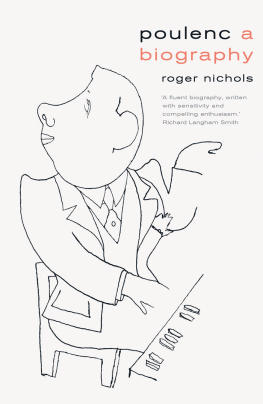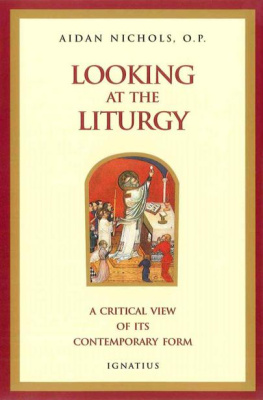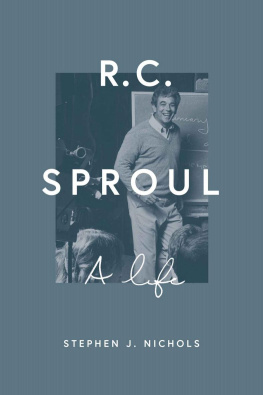Roger Nichols - Poulenc
Here you can read online Roger Nichols - Poulenc full text of the book (entire story) in english for free. Download pdf and epub, get meaning, cover and reviews about this ebook. publisher: Yale University Press, genre: Detective and thriller. Description of the work, (preface) as well as reviews are available. Best literature library LitArk.com created for fans of good reading and offers a wide selection of genres:
Romance novel
Science fiction
Adventure
Detective
Science
History
Home and family
Prose
Art
Politics
Computer
Non-fiction
Religion
Business
Children
Humor
Choose a favorite category and find really read worthwhile books. Enjoy immersion in the world of imagination, feel the emotions of the characters or learn something new for yourself, make an fascinating discovery.
- Book:Poulenc
- Author:
- Publisher:Yale University Press
- Genre:
- Rating:3 / 5
- Favourites:Add to favourites
- Your mark:
- 60
- 1
- 2
- 3
- 4
- 5
Poulenc: summary, description and annotation
We offer to read an annotation, description, summary or preface (depends on what the author of the book "Poulenc" wrote himself). If you haven't found the necessary information about the book — write in the comments, we will try to find it.
Poulenc — read online for free the complete book (whole text) full work
Below is the text of the book, divided by pages. System saving the place of the last page read, allows you to conveniently read the book "Poulenc" online for free, without having to search again every time where you left off. Put a bookmark, and you can go to the page where you finished reading at any time.
Font size:
Interval:
Bookmark:
POULENC

Copyright 2020 Roger Nichols
All rights reserved. This book may not be reproduced in whole or in part, in any form (beyond that copying permitted by Sections 107 and 108 of the U.S. Copyright Law and except by reviewers for the public press) without written permission from the publishers.
For information about this and other Yale University Press publications, please contact:
U.S. Office:
Europe Office:
Set in Fournier MT by IDSUK (DataConnection) Ltd
Printed in Great Britain by TJ International Ltd, Padstow, Cornwall
Library of Congress Control Number: 2020931416
ISBN 978-0-300-22650-8
A catalogue record for this book is available from the British Library.
10 9 8 7 6 5 4 3 2 1
To Sarah and Sidney,
this volumes twin anges gardiennes
TABLE OF CONTENTS
PLATES
ACKNOWLEDGEMENTS
One of the pleasures of writing this book has come from the enthusiasm that has greeted all my enquiries: for this, as well as for the information supplied, I am grateful to the following: Michelle Biget-Mainfroy, Beatrice Brooke, Sidney Buckland, Sir Humphrey Burton, Fiorenza Cossotto, Evelyne Crochet, Alan Crumpler, Sister Philippa Edwards, Dom Michael Evans OSB, Barrie Gavin, Yvonne Gouvern, Henri Hell, Eva Hornstein, Daniel Jaff, Herv Lacombe, Richard Langham Smith, Marie-Ange Lebedeff, Dame Felicity Lott, Andrew McCrae, Graham Melville-Mason, Otfrid Nies, Robert Orledge, Roger Pines, Yves Pouliquen, Manuel Rosenthal, Rohan de Saram, Benot Seringe, Rosine Seringe, Nigel Simeone, Nicolas Southon, Charles Timbrell, Jon Tolansky, Sir John Tooley, Bishop Erik Varden, Marina Vecci and Virginia Zeani. I am equally grateful to the personnel of the following libraries for their assistance: Bibliothque nationale de France (Dpartement de la Musique), Bodleian Library, Hereford Public Library, Mdiathque musicale Mahler, Morgan Library and Museum, Harry Ransom Humanities Research Center of University of Texas at Austin, Music Faculty Library of Oxford University, Beinecke Rare Book and Manuscript Library of Yale University.
I am happy to acknowledge generous financial help from the Association des Amis de Francis Poulenc, the British Academy/Leverhulme Small Research Grants and The Society of Authors Authors Foundation.
Picture credits: Collection Francis Poulenc 18, 11, 12, 14, 19, 23, 2833; Collection Lucien Berton 9, 10, 13; Collection Winifred Radford S. Buckland 16, 17, 24; Estate of Felix Aprahamian by kind permission of The Arabesque Trust 27; Fiorenza Cossotto 25; Fondation Singer-Polignac 18; Lipnitzki/Roger Viollet/Getty Images 15; Pierre Miscevic, Francis Poulenc, Lettres indites Brigitte Manceaux, by kind permission of d. Orizons, Paris, 2019 21, 22; Roger Wood: Royal Opera House/Arena Pal: www.arenapal.com 26
Note: A brief comment on the thorny question of comparative prices. In March 1935 the French franc was valued at 71 to the pound sterling; 1 in 1935 was worth roughly 68 in 2018. By these computations, the 25,000 francs from the Princesse de Polignac for Poulencs Concerto for two pianos and the same sum from the Noailles for Le Bal masqu are each equivalent today to about 24,000. These sums are made less secure by Frances abandonment of the Gold Standard in 1936, but nonetheless give some idea of their generosity and that of Edward James at the end of the decade.
All translations are mine.
Roger Nichols
Kington
Herefordshire
April 2019
PREFACE
In retrospect, the first years of the twentieth century in Paris must have seemed golden to those who subsequently survived two world wars and the financial and political turbulence of the intervening years lentre-deux-guerres. For this short period, tradition and innovation seemed to be held in some kind of balance. If, in the last of the five international exhibitions in 1900, one of the most visited exhibits was one displaying le Vieux Paris in all its picturesque glory, by contrast Picassos Blue period would lead to his Pink one on the way to Cubism. Throughout the period the horse was gradually giving way to the bicycle, and then the bicycle to the motor car, no doubt with some confusion. But the opening of the first mtro line in July 1900 meant that instead of taking 90 minutes to cross from the Porte Maillot to Vincennes, you could now do it in 25 minutes. Life was further accelerated by general electrification, by the telephone and by the pneumatiques which sped messages through the city by tubes of compressed air. Then on 25 July 1909, a cause of huge national pride, Louis Blriot made his first airplane flight over La Manche (otherwise known as the English Channel).
While the Dreyfus Case had dragged on until 1906, much of public opinion seems to have felt the injustice of it and accepted the truth of the matter sometime before that, even if not all the friendships it had shattered would be restored. Whether as a result of this case or not, anti-military novels began to appear around this time, and Romain Rollands ten-volume saga Jean-Christophe, published between 1906 and 1912, contained pleas for Franco-German understanding. Elsewhere on the French diplomatic front in the early years of the century, relations with Russia and Italy were now good, followed in April 1904 by the Entente Cordiale with Britain, promoted to some extent by King Edward VIIs popular visit to France the previous year. Internal politics too were now more stable, no politician being assassinated between President Sadi Carnot in 1894 and Jean Jaurs in 1914.
Meanwhile the caf-concert continued to flourish, as did the theatre with Sarah Bernhardt its uncrowned queen. In the musical theatre two cultural icons were paramount. In 1908 the impresario Sergei Diaghilev brought Musorgskys Boris Godunov to Paris with Chaliapin in the title role, and followed this up with Stravinskys three great ballets in 1910 (The Firebird), 1911 (Petrushka) and 1913 (The Rite of Spring). But before that, in 1902, Debussy had not been quite as revolutionary with his opera Pellas et Mlisande which, though not wholly free of Wagners influence, passed it through a prism of nuance and understatement. These two cultures together were crucial in the musical development of the young Francis Poulenc.
Alistair Horne sums up: Whether on stage or screen or in the cabarets, the message of that first decade and a half of the new century before the deluge was one of relentless optimism. There were of course saving graces. One of these was a wholehearted embrace of his French heritage. We begin, then, with him following Debussys line in his thoughts on the musical tradition of Frances north-eastern neighbour.
I
OVERTURE AND BEGINNERS
 18991918
18991918 
On 6 September 1919 the twenty-year-old Francis Poulenc wrote to Otto Marius Kling, the director of the London publishers J. & W. Chester, I detest Wagner because I dont like fake music, cardboard dragons and flighty goddesses;
If its true that we are defined as much by our antipathies as by our enthusiasms, it may be worth asking what, in Poulencs opinion, was this French temperament which, by implication, accorded with his own; whether indeed it existed (given that, for Pierre Boulez, there was no such thing as a valid French musical tradition); charm and delight; in place of textures that swamp the listener, primary colours with plenty of space around them.
Of course these general characteristics admit of exceptions. But the main thrust of Wagner, as of Brahms and Bruckner, was towards a seriousness that demanded respect and unyielding concentration. If there are jokes (and one cant be sure that Siegfrieds Das ist kein Mann, on finding Brnnhilde on her mountain top, qualifies as such), they are mostly peripheral to the main argument. Born as he was (at 2 rue Cambacres, now place des Saussaies, in the 8th arrondissement) on 7 January 1899, Poulenc the composer avoided the full flood of French
Next pageFont size:
Interval:
Bookmark:
Similar books «Poulenc»
Look at similar books to Poulenc. We have selected literature similar in name and meaning in the hope of providing readers with more options to find new, interesting, not yet read works.
Discussion, reviews of the book Poulenc and just readers' own opinions. Leave your comments, write what you think about the work, its meaning or the main characters. Specify what exactly you liked and what you didn't like, and why you think so.










